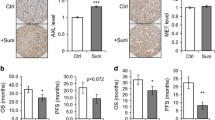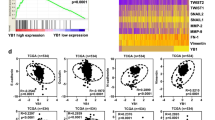Abstract
Purpose
This study aimed to clarify the molecular mechanism mediating the cytotoxicity of axitinib, a selective inhibitor of the vascular endothelial growth factor receptor (VEGFR), in sunitinib-resistant renal cell carcinoma (RCC).
Methods
In our previous study (Sakai et al. in BJU Int 112:E211–E220, 2013), a human RCC cell line, ACHN, resistant to sunitinib (ACHN/R), was developed from a parental cell line (ACHN/P). Differences in molecular phenotypes following treatment with sunitinib or axitinib between these two cell lines were compared.
Results
ACHN/R showed an approximately fivefold higher IC50 of sunitinib than ACHN/P; however, there was no significant difference in the sensitivity to axitinib between these two cell lines. In ACHN/R, despite the lack of a difference in the phosphorylated (p)-Akt or STAT-3 expression between treatment with sunitinib and axitinib, the expression of p-p44/42 mitogen-activated protein kinase (MAPK) and p-VEGFR-2 after treatment with axitinib was markedly down-regulated compared with those after treatment with sunitinib. Furthermore, additional treatment of ACHN/R with an inhibitor of MAPK kinase significantly enhanced the cytotoxic activity of sunitinib, but not that of axitinib. In vivo growth of ACHN/R in nude mice after treatment with axitinib was significantly inhibited compared with that following treatment with sunitinib, accompanying the marked inhibition of angiogenesis.
Conclusions
Antitumor activity of axitinib in RCC cells even after the acquisition of resistance to sunitinib could be explained, at least in part, by the inactivation of p44/42 MAPK and VEGFR-2, which were persistently phosphorylated in sunitinib-resistant RCC cells under treatment with sunitinib.




Similar content being viewed by others
References
Figlin R, Sternberg C, Wood CG. Novel agents and approaches for advanced renal cell carcinoma. J Urol. 2012;88:707–15.
Schmidinger M, Larkin J, Ravaud A. Experience with sunitinib in the treatment of metastatic renal cell carcinoma. Ther Adv Urol. 2012;4:253–65.
Rini BI, Escudier B, Tomczak P, Kaprin A, Szczylik C, Hutson TE, et al. Comparative effectiveness of axitinib versus sorafenib in advanced renal cell carcinoma (AXIS): a randomised phase 3 trial. Lancet. 2011;378:1931–9.
Escudier B, Szczylik C, Porta C, Gore M. Treatment selection in metastatic renal cell carcinoma: expert consensus. Nat Rev Clin Oncol. 2012;9:327–37.
Ho TH, Jonasch E. Axitinib in the treatment of metastatic renal cell carcinoma. Future Oncol. 2011;7:1247–53.
Sakai I, Miyake H, Fujisawa M. Acquired resistance to sunitinib in human renal cell carcinoma cells is mediated by constitutive activation of signal transduction pathways associated with tumour cell proliferation. BJU Int. 2013;112:E211–20.
Kumano M, Miyake H, Kurahashi T, Yamanaka K, Fujisawa M. Enhanced progression of human prostate cancer PC3 cells induced by the microenvironment of the seminal vesicle. Br J Cancer. 2008;98:356–62.
Harada K, Miyake H, Kumano M, Fujisawa M. Acquired resistance to temsirolimus in human renal cell carcinoma cells is mediated by the constitutive activation of signal transduction pathways through mTORC2. Br J Cancer. 2013;109:2389–95.
Kusuda Y, Miyake H, Gleave ME, Fujisawa M. Clusterin inhibition using OGX-011 synergistically enhances antitumour activity of sorafenib in a human renal cell carcinoma model. Br J Cancer. 2012;106:1945–52.
Bielecka ZF, Czarnecka AM, Solarek W, Kornakiewicz A, Szczylik C. Mechanisms of acquired resistance to tyrosine kinase inhibitors in clear - cell renal cell carcinoma (ccRCC). Curr Signal Transduct Ther. 2014;8:218–28.
Rini BI, Atkins MB. Resistance to targeted therapy in renal-cell carcinoma. Lancet Oncol. 2009;10:992–1000.
Joosten SC, Hamming L, Soetekouw PM, Aarts MJ, Veeck J, van Engeland M, et al. Resistance to sunitinib in renal cell carcinoma: from molecular mechanisms to predictive markers and future perspectives. Biochim Biophys Acta. 2015;1855:1–16.
Su SC, Hu X, Kenney PA, Merrill MM, Babaian KN, Zhang XY, et al. Autotaxin-lysophosphatidic acid signaling axis mediates tumorigenesis and development of acquired resistance to sunitinib in renal cell carcinoma. Clin Cancer Res. 2013;19:6461–72.
Harada K, Miyake H, Kusuda Y, Fujisawa M. Characterization of mechanism involved in acquired resistance to sorafenib in a mouse renal cell cancer RenCa model. Clin Transl Oncol. 2014;16:801–6.
Posadas EM, Limvorasak S, Sharma S, Figlin RA. Targeting angiogenesis in renal cell carcinoma. Expert Opin Pharmacother. 2013;14:2221–36.
Hu-Lowe DD, Zou HY, Grazzini ML, Halin ME, Wickman GR, Amundson K, et al. Nonclinical antiangiogenesis and antitumor activities of axitinib (AG-013736), an oral, potent, and selective inhibitor of vascular endothelial growth factor receptor tyrosine kinases 1, 2, 3. Clin Cancer Res. 2008;14:7272–83.
Van Cruijsen H, van der Veldt A, Hoekman K. Tyrosine kinase inhibitors of VEGF receptors: clinical issues and remaining questions. Front Biosci. 2009;14:2248–68.
Author information
Authors and Affiliations
Corresponding author
Ethics declarations
Conflict of interest
The authors declare that they have no conflict of interest.
Informed consent
Informed consent was obtained from all individual participants included in the study.
Ethical approval
All procedures performed in studies involving human participants were in accordance with the ethical standards of the institutional and national research committee and with the 1964 Helsinki Declaration and its later amendments or comparable ethical standards. All applicable international, national and institutional guidelines for the care and use of animals were followed.
Rights and permissions
About this article
Cite this article
Miyazaki, A., Miyake, H. & Fujisawa, M. Molecular mechanism mediating cytotoxic activity of axitinib in sunitinib-resistant human renal cell carcinoma cells. Clin Transl Oncol 18, 893–900 (2016). https://doi.org/10.1007/s12094-015-1457-x
Received:
Accepted:
Published:
Issue Date:
DOI: https://doi.org/10.1007/s12094-015-1457-x




